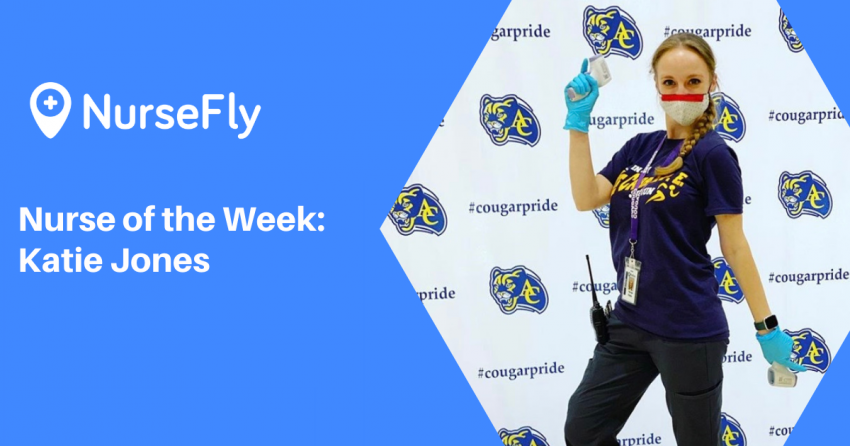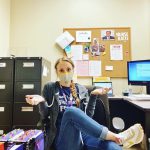How long have you been a school nurse?
I’ve been a school nurse since November of 2019. Prior to that, I worked as a charge nurse in acute psychiatry for a large hospital in St. Louis, Missouri. I’m also a professional musician, and I spent about 4 years living in Norway and focusing on music before moving back to the US to continue practicing nursing. This is my first full year as a school nurse, so I am still feeling very “new.”
Why did you get into school nursing?
Psychiatric nursing was my passion for years, but I discovered that I needed a hysterectomy in the summer of 2019. Our facility, unfortunately, was feeling less and less safe leading up to my surgery. I decided with the guidance of my surgeons, coworkers, and loved ones to resign from the position near the end of my recovery period. Feeling unsafe at work had been weighing on me more than I realized, and the idea of returning became terrifying. I didn’t feel like I had the support of my managers and the environment was anything but therapeutic for our patients. After having time to mentally process witnessing multiple coworkers and patients being violently assaulted with no support or repercussions, returning simply wasn’t an option.
By the time I fully recovered, I had already obtained licensure in Illinois and signed up with my hometown’s school district to substitute (nursing and teaching) for the 7 schools in our area while I applied for other psych and clinical positions. My plans for my life had changed completely after my hysterectomy, and I was eager to find a nursing job with no nights, weekends, or holidays — or find an entirely new career. Being able to spend time with my significant other and his son, to be there for dinner every night, to make it to every soccer game, became my top priority. Hospital nursing just didn’t feel like a viable option anymore. Luckily, something just “clicked” the first time I subbed at the junior high level. Within about a month, one of the junior high nurses for whom I was subbing submitted her letter of resignation. I interviewed for her position and got it! Knowing at age 32 that I wasn’t going to have children of my own as I’d always planned was incredibly hard to accept, but taking care of the children in my own hometown has definitely filled a void I initially thought may perhaps be insurmountable.
By the time I fully recovered, I had already obtained licensure in Illinois and signed up with my hometown’s school district to substitute (nursing and teaching) for the 7 schools in our area while I applied for other psych and clinical positions. My plans for my life had changed completely after my hysterectomy, and I was eager to find a nursing job with no nights, weekends, or holidays — or find an entirely new career. Being able to spend time with my significant other and his son, to be there for dinner every night, to make it to every soccer game, became my top priority. Hospital nursing just didn’t feel like a viable option anymore. Luckily, something just “clicked” the first time I subbed at the junior high level. Within about a month, one of the junior high nurses for whom I was subbing submitted her letter of resignation. I interviewed for her position and got it! Knowing at age 32 that I wasn’t going to have children of my own as I’d always planned was incredibly hard to accept, but taking care of the children in my own hometown has definitely filled a void I initially thought may perhaps be insurmountable.
I love that I’m in a nursing position where I can continue to use therapeutic communication much as I did in psych; anyone with a junior high aged child probably knows that emotions and “drama” can run high, and I am proud to be someone that students seek out when they need to talk. I tell my students and their families all the time: To me, wellness is not just a number on a thermometer. A stomachache or headache can be the result of anxiety, and sometimes simply letting my students feel heard is all they need to make it back to class instead of wanting to go home. Mental health is just as important as physical health in my office.
What are the biggest challenges you are facing at the moment going back to school?
One of the biggest challenges has been keeping up with guidance, whether it’s from the local, state, or federal level. Do we need to take temperatures for students when they return or not? Will I have time to gather seating charts from teachers so I can assist with contact tracing? Oh gosh, have I even finished my contact tracing course?! Should I set up stations in hallways for commonly needed first-aid items, or give each teacher a first aid kit, or set up a “mobile” cart so I can travel from class to class as needed? (I’m going to do all 3). There are a million questions racing through my head 24/7 lately, and I don’t even have students in my building yet!
I’ve been in my office daily since July trying to wrap my head around all of the required paperwork I need from my ~700 families, learning vaccine schedules, creating an “isolation room” for symptomatic students, and continuing to navigate how best to utilize our School Management Software for charting and creating compliance reports. I’ve also put some extra (welcome) stress on myself by volunteering to create a new Health Services website and creating/maintaining a Google Classroom for students to interact with me while we’re remote. This job is definitely far more autonomous than anything I experienced in the hospital setting. Because I’m so new, sometimes that autonomy is a breath of fresh air and sometimes I feel very lost. I’m lucky that I have administrators who are helpful and supportive, and I am extremely lucky that I have 6 other nurses who have been showing me the ropes and helping me with anything and everything I’ve needed. The camaraderie between the nurses in my district is unlike anything I ever experienced in the hospital setting. My fellow school nurses are amazing. All in all, as difficult as this pandemic has been to plan around, I absolutely love this job.
What would you tell Nurses out there with children who are sending their children back to school?
For nurses who are sending their children back to school, I suppose it all depends on where you live and your student’s grade level. Even though we’re remote, I have to collect all of the required health data as if we were in-person, so make sure your kiddo has whatever physicals/immunizations/
My heart goes out to all of the nurses working on the front-lines during this pandemic with children at home. Try to get to know your child’s own school nurse; I love discovering that parents are nurses, too! But I can’t help feeling like the “bad guy” for calling a fellow nurse at work to come to get their students. My advice for parents who are nurses is the same that I give to all parents right now: try to find a neighbor, friend, or a family member who could pick up your child from school if they’re in any way symptomatic.
This school year is a whole new ballgame — as school nurses, depending on location and guidelines, we’re likely going to be obligated to send symptomatic students home. As you know, pretty much everything is a symptom of COVID-19. Cold and flu season this year is gearing up to be a very stressful period in schools. If your kiddo tells me they’re feeling icky and that they’ve ralphed in the bathroom “but flushed it,” I’m going to have to go by what they tell me. Our criteria for sending students home has changed drastically, and we have to stick to it to avoid risking potential exposure. Have a plan, understand that what might only be a cold might mean your child being sent home, and know that your school nurse (if they’re anything like me!) is there for your student and for you. My goal for the beginning of this school year has been not only to get my own office in working order for a return to in-person learning, but also to help families in any way I can while we’re remote, including delivering meals 3 days a week and calling physician’s offices so that parents can focus on their own families and work instead of acting as the middle-man to give me missing documents. It’s a wild time in our lives, but we can get through this together!






